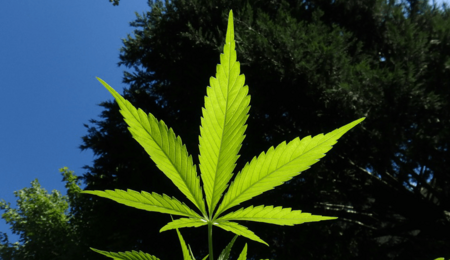California Court Saves Nation's Largest Pot Shop from Eviction

A landlord cannot evict the business for activities explicitly protected under state law
A landlord cannot evict the business for activities explicitly protected under state law
SOURCE: www.rawstory.com AUTHOR: Stephen C. Webster The owner of Oakland's Harborside Health Center, widely regarded as the nation's largest medical marijuana dispensary, won a major court victory on Friday when a state judge ruled that a landlord cannot evict the business for activities explicitly protected under state law. Speaking to Raw Story on Monday, Harborside executive director Steve DeAngelo couldn't sound happier about the judge's call, saying the case represents a victory for everyone involved in California's retail marijuana industry. "We won a huge victory not just for Harborside, but for every medical cannabis provider in the state, and there's hundreds of them," he said. "The court ruled that California courts must enforce California law. That principle extends even to private parties. Essentially, what the court said is that organizations that comply with state law deserve the protection of that state law." DeAngelo's store has been under threat of closure for months thanks to U.S. Attorney Melinda Haag, appointed by President Barack Obama in 2010 to oversee federal prosecutions in the northern district of California. In her short tenure, she's become known to advocacy group Americans for Safe Access as one of the most ardent drug warriors the Department of Justice has, helping shut down hundreds of dispensaries and build the image of Obama being "worse than Bush" when it comes to pot, as one source told Raw Story earlier this year. Not long ago, Haag filed in federal court to seize the structure that houses Harborside, just one of many pot shops she's targeted across the state. When the landlord received notice, she immediately began trying to evict Harborside in hopes of avoiding her property being seized by the government. That led to a messy legal fight with multiple fronts, and while it seems to be progressing in DeAngelo's favor, the real battle is not yet won.
"The only reason our landlord tried to evict us is because the U.S. Attorneys threatened to seize property from her," he said. "[The landlord] actually had no problem with us. We had a great relationship for years. We just renewed our lease a year ago. So, this was all done at the behest of the U.S. Attorneys. This is more of a defeat for the U.S. Attorney than for the landlord."
DeAngelo will be back in court later this month for preliminary motions in not one, but two cases: the federal government's property seizure claim, and a lawsuit filed by the City of Oakland in hopes of saving the dispensary. Oakland officials approved the lawsuit in October, eyeing the distinct possibility that the source of more than $1 million in local tax revenues could be cut off. The city's lawsuit aims to convince a federal judge that the seizure is beyond the federal statute of limitations on property seizures, which is five years. Harborside has been open since 2006.
"I really have been trying to figure out why any well meaning public servant would be taking the actions that Melinda Haag is taking," DeAngelo lamented. "We have created a great situation at Harborside. We've taken $22 million of illegal drug sales right off the streets of Oakland. We've reduced the burden on law enforcement. We've raised over $3.5 million in tax revenue each year and created over 100 well paying jobs. I think the U.S. Attorneys are afraid that good examples of well regulated cannabis distribution in Oakland and other cities are going to discredit their failed drug war policies."
Not long ago, Haag filed in federal court to seize the structure that houses Harborside, just one of many pot shops she's targeted across the state. When the landlord received notice, she immediately began trying to evict Harborside in hopes of avoiding her property being seized by the government. That led to a messy legal fight with multiple fronts, and while it seems to be progressing in DeAngelo's favor, the real battle is not yet won.
"The only reason our landlord tried to evict us is because the U.S. Attorneys threatened to seize property from her," he said. "[The landlord] actually had no problem with us. We had a great relationship for years. We just renewed our lease a year ago. So, this was all done at the behest of the U.S. Attorneys. This is more of a defeat for the U.S. Attorney than for the landlord."
DeAngelo will be back in court later this month for preliminary motions in not one, but two cases: the federal government's property seizure claim, and a lawsuit filed by the City of Oakland in hopes of saving the dispensary. Oakland officials approved the lawsuit in October, eyeing the distinct possibility that the source of more than $1 million in local tax revenues could be cut off. The city's lawsuit aims to convince a federal judge that the seizure is beyond the federal statute of limitations on property seizures, which is five years. Harborside has been open since 2006.
"I really have been trying to figure out why any well meaning public servant would be taking the actions that Melinda Haag is taking," DeAngelo lamented. "We have created a great situation at Harborside. We've taken $22 million of illegal drug sales right off the streets of Oakland. We've reduced the burden on law enforcement. We've raised over $3.5 million in tax revenue each year and created over 100 well paying jobs. I think the U.S. Attorneys are afraid that good examples of well regulated cannabis distribution in Oakland and other cities are going to discredit their failed drug war policies."
 Either that, he said, or she's hoping to run for office some day. "There doesn't seem to be any other logical reason for it," DeAngelo concluded.
As for the bigger question of whether America will one day see legalized marijuana everywhere, DeAngelo isn't as down on President Obama as others in the reform movement.
"I tend to believe that the crackdown on medical cannabis did not come from the innermost parts of the Obama administration," he said. "I think this is more likely an attempt by drug war-era U.S. Attorneys to capitalize on the administration's electoral concerns in order to take aim at cannabis. It's no coincidence that the crackdown started in 2011 on the eve of the presidential campaigns."
DeAngelo added that the Justice Department's odd silence on the legalization initiatives that passed in Colorado and Washington is a "hopeful sign" that the federal government is softening its position against adult marijuana use. "I don't think the change will happen on its own, but I think if the cannabis reform movement keeps up the very successful drumbeat of pressure that we have been over the past several months, we have a good chance of pushing the Obama administration into a better position," he said.
Either that, he said, or she's hoping to run for office some day. "There doesn't seem to be any other logical reason for it," DeAngelo concluded.
As for the bigger question of whether America will one day see legalized marijuana everywhere, DeAngelo isn't as down on President Obama as others in the reform movement.
"I tend to believe that the crackdown on medical cannabis did not come from the innermost parts of the Obama administration," he said. "I think this is more likely an attempt by drug war-era U.S. Attorneys to capitalize on the administration's electoral concerns in order to take aim at cannabis. It's no coincidence that the crackdown started in 2011 on the eve of the presidential campaigns."
DeAngelo added that the Justice Department's odd silence on the legalization initiatives that passed in Colorado and Washington is a "hopeful sign" that the federal government is softening its position against adult marijuana use. "I don't think the change will happen on its own, but I think if the cannabis reform movement keeps up the very successful drumbeat of pressure that we have been over the past several months, we have a good chance of pushing the Obama administration into a better position," he said.
S
Soft Secrets



